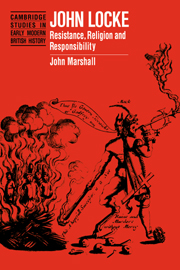Book contents
- Frontmatter
- Contents
- Acknowledgements
- List of abbreviations
- Introduction: Locke's intellectual development
- PART I RELIGION AND THE POLITICS OF TOLERATION
- PART II RESISTANCE AND RESPONSIBILITY
- PART III HERESY, PRIESTCRAFT AND TOLERATION; JOHN LOCKE AGAINST THE ‘EMPIRE OF DARKNESS’
- Conclusion
- Bibliography
- Index
- Cambridge Studies in Early Modern British History
Introduction: Locke's intellectual development
Published online by Cambridge University Press: 07 January 2010
- Frontmatter
- Contents
- Acknowledgements
- List of abbreviations
- Introduction: Locke's intellectual development
- PART I RELIGION AND THE POLITICS OF TOLERATION
- PART II RESISTANCE AND RESPONSIBILITY
- PART III HERESY, PRIESTCRAFT AND TOLERATION; JOHN LOCKE AGAINST THE ‘EMPIRE OF DARKNESS’
- Conclusion
- Bibliography
- Index
- Cambridge Studies in Early Modern British History
Summary
At the Restoration of the Stuart monarchy and of the Church of England in 1660–2 John Locke supported almost none of the positions of the Two Treatises and the Essay Concerning Human Understanding that have made him the subject of continuing study. In the early 1660s Locke appears to have been a believer in innate ideas as the foundation of much of morality and religion. He was an unequivocal opponent of religious toleration and of rights of resistance and was instead a supporter of absolute and arbitrary government in all civil and ecclesiastical ‘indifferent’ matters – that is, those matters that were not expressly commanded or forbidden in Scripture. He countenanced a consensual source of governmental authority only as a theoretical possibility irrelevant to its extent.
During the following twenty-five years Locke became the strong opponent of innatism that is now famous from the Essay; the leading theoretician in England of religious toleration in several Letters Concerning Toleration; and the advocate of limited government, of rights of resistance, and of the necessity of individual consent to political society in the Treatises. Between the early 1660s and the 1690s he changed from being a trinitarian who very probably held a strong view of the Fall and of original sin – in common with almost all of his contemporaries – to becoming at the least heterodox in his expressions about the Trinity and original sin and very probably in private an Unitarian heretic.
- Type
- Chapter
- Information
- John LockeResistance, Religion and Responsibility, pp. xv - xxiiPublisher: Cambridge University PressPrint publication year: 1994



